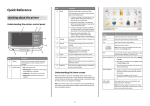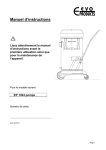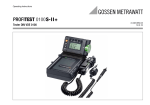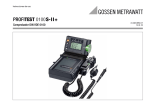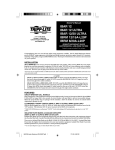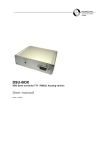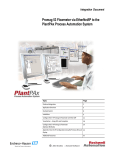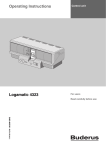Download OPERATING INSTRUCTIONS - DIAMOND CORE DRILL
Transcript
GB OPERATING INSTRUCTIONS - DIAMOND CORE DRILL DK 22, DK 32, DK 34 Please read these instructions carefully before starting up the machine! In the WEKA diamond core drilling machine you have an outstanding quality product with which you will be very satisfied, provided you use it properly. Specifications Machine type Nominal voltage Nominal current Nominal power Power output Nominal frequency Speed (full load) DK 22 DK 22 L 230 230 11,5 11,5 2400 2400 1640 1640 50-60 50 - 60 250 300 640 520 960 780 Drill i in concrete - mm 40 - 250 50 - 300 * Weight kg 11,9 11,9 Tool fixture DK 22 (L,S), DK32 - 1 1/4" UNC Tool fixture DK 2203 (L,S) - 1 1/4" + G 1/2" V A W W Hz 1/min DK 22 S 230 11,5 2400 1640 50 - 60 420 880 1300 30 - 180 11,9 DK 32 230 15 3200 2300 50 - 60 230 480 720 55 - 350 11,9 DK 32 S 230 15 3200 2300 50 - 60 300 590 930 40 - 250 11,9 DK 34 230 15 3200 2300 50 - 60 150 300 470 85 - 400 12,9 * Holes with diameters over 250 mm can only be established with particulary stable rigs and the use of heavy duty dowels for fastening Operating data DK 22 Position/speed Drill i concrete Water volume approx. Operating data DK 22 L Position/speed Drill i concrete Water volume approx. Operating data DK 22 S Position/speed Drill i concrete Water volume approx. Operating data DK 32 Position/speed Drill i concrete Water volume approx. Operating data DK 32 S Position/speed Drill i concrete Water volume approx. Operating data DK 34 Position/speed Drill i concrete Water volume approx. 1/min mm l/min 1/300 130 - 250 1,5 - 2,0 2/640 60 -120 1,0 - 1,4 3/960 40 - 80 0,8 - 1,1 1/min mm l/min 1/250 150 - 300 1,6 - 2,2 2/520 75 - 150 1,1 - 1,6 3/780 50 - 100 0,9 - 1,3 1/min mm l/min 1/420 90 - 180 1,2 - 1,7 2/880 45 - 85 0,8 - 1,2 3/1300 30 - 60 0,7 - 1,0 1/min mm l/min 1/230 165 - 350 1,7 - 2,4 2/480 80 - 160 1,1 - 1,6 3/720 55 - 105 0,9 - 1,3 1/min mm l/min 1/300 125 - 250 1,5 - 2,0 2/590 65 - 130 1,0 - 1,5 3/930 40 - 80 0,8 - 1,2 1/min mm l/min 1/150 250 - 400 2,0 - 2,5 2/300 125 - 250 1,5 - 2,0 3/470 80 - 160 1,2 - 1,6 8 1. TECHNICAL DESCRIPTION DK22, DK32 and DK34 are diamond core drills which are operated only when fixed in a rig (2) (rigcontrolled).This core drill is only intended for professional use and may only be operated by trained personnel. Proper use extends only to the drilling of rock, concrete masonry and asphalt. By the addition of water through the diamond drill bit (3) via the ball valve (1a) the drilled material is flushed away and the tool cooled (wet drilling). The drilling tool, the diamond drill bit (3), is a hollow drill (tube) which is fitted with soldered-on or welded-on segments impregnated with diamonds. If necessary, the flushing water is extracted through a water collecting ring (4) by means of an all-purpose suction unit. ATTENTION: Avoid wet drilling upwards (overhead drilling). If it is indispensable use absolutely a perfect, all right and functioning water-collecting ring. 1.1 Scope of delivery Diamond core drilling machine (1) with ball valve and plug-in nipple (1a), PRCD (GFCI) circuit-breaker (1b) and operating instructions. 1.2 Noise emissions and vibration (EN 50144) The typical A-rated sound pressure level is 86 dB(A). The typical A-rated sound level is 99 dB. The typical rated acceleration is 2.5 m/s². 2. PREPARATION Satisfy yourself that the machine has not been damaged in transit. Check that the nominal voltage is the same as the voltage indicated on the rating plate. 2.1 Electrical connection According the European standards EN 61029-1 and IEC 1029-2-6, the electrical connection of diamond core drills with water supply must be operated via a residual current device (RCD, PRCD) and to a properly earthed socket. In accordance with these regulations, the DK22/DK32/DK34 is fitted with an inline protector (PRCD) (1b) mounted in the cord. This contains both, RCD protection and undervoltage tripping. The PRCD must be switched on using the ON key after the power plug has been inserted into the socket outlet. In the event of a voltage drop, the PRCD will switch off and must then be switched on again once the power supply has been reestablished. The rated current, i.e. the fault current at which the PRCD switches off, is 30 mA. The PRCD must not lie in water. It must be checked for perfect functioning at regular intervals by pressing the TEST key. Never operate a diamond core drilling machine without RCD or PRCD directly from the mains system. 2.2 Water connection Connect the water to the water supply via the plug-in nipple. Attention: max. water pressure 3 bar. Please use a GARDENA coupling as the connecting piece to the machine. This can be obtained from a garden center or builders' merchant. Use only clean water, as dirty water will cause the seals to wear very quickly. 2.3 Assembling at the drill rig The DK22/32 is fastened at the gear foot (see illustration) with 4 M8 screws on the rig (2). Choose screws which a length of thread engagement of at least 15 mm. Place the machine only in a stable rig which has precise guides free from clearance. Ensure that the machine axis is absolutely parallel to the upright column. Only use rigs with sufficient stability. 9 2.4 Mains switch (1c) and integral over current protection After having switched on the motor starts softly. If the machine is being overloaded, the motor electronic switches over to the pulsating operation for showing the operator the overload. If the force is then not reduced, the motor switches off after a few seconds. After switching the machine off and on again, the motor start again softly. Before switching the machine on again, ensure that the drill bit can be turned easily and is not jammed in the drill hole. The motor electronic can temporarily be used on 260 Volt (resp. 140 Volt on 110 Volt machines). Higher voltages however can cause irreparable damages. Please note that when operating the machine via a generator, this does not generate higher voltage peaks. 2.5 Gear change The DK22/32 has a 3-speed gear. Never use force to switch over, and only switch over when the machine is decelerating or has stopped. Always select the appropriate speed for the drill diameter (see table and rating plate on the machine). 2.6 Friction clutch The integrated friction clutch protects operating personnel, the machine and the tool against high mechanical overloads. Please ensure that the release time of the clutch is not more than 3 - 4 seconds, because otherwise wear and heat will increase rapidly. 3. PUTTING INTO OPERATION 3.1 Diamond drill bit The tool fixture of the DK 22/DK 32 consists of a thread 1 ¼" UNC, respectively of a combination of 1 1/4" male and G1/2" female. Only use suitable high quality diamond tools. Use sharp tools and ensure that the diamond segments are sufficiently larger than the inner and outer diameter of the drill bit tube. Apply water-resistant grease to the tool thread so that the tool can be easily loosened. Ensure that the radial run out at the diamond segments of the drill bit is no greater than 1 mm (eccentricity). Only use suitable wrenches for changing the core bit. Thereby hold the drilling spindle with another wrench. Never use a hammer or something similar to open the core bit. If necessary elongate the wrench. 3.2 Drilling Since the rig is not included in the delivery, only a few important features are noted here. Please adhere to the operating instructions for the drill rig. Fixing methods Dowel fixing, vacuum fixing, bracing. The most common method of fixing is dowel fixing. Use metal dowels if at all possible. The diameter of the dowels must be at least 12 mm. With vacuum fixing, ensure there is a sufficiently great vacuum. Make sure that the sealing rings are not worn out. Ensure that the rig is only rigid when the sealing ring is relaxed via the jackscrews on the base of the rig. Set the volume of water at the ball valve (1a) so, that the waste material is completely flushed from the drill hole. If drilling mud forms round the drill hole, you are not using enough water. Use force as required. If you do not, the diamonds will tend to "polish". In this case the rate of advance will fall constantly until cutting finally stops. Sometimes the segments can be resharpened again by using an SiC grindstone. Take care that the drill bit does not vibrate, otherwise the diamonds can be tugged out their bond. When drilling through iron reinforcements, use a greater initial pressure and the next lower gear. 10 If the drill blocks, do not try to loosen it by switching the machine on and off. Switch the machine off immediately and try to loosen the drill bit by turning right and left using a suitable wrench. Carefully remove the machine from the borehole. 4. MAINTENANCE You must remove the mains plug from the supply socket before beginning any maintenance or repair work. Clean the machine with a dry or moist cleaning-rag and not with a jet of water. Make sure that no water gets into the motor or the switch box. Ensure that the ventilation slots are always clean. Clean and grease the tool thread, too. Damaged PRCDs, cords and plugs have to be repaired or exchanged exclusively in an authorized repair station (www.weka-elektrowerkzeuge.de). 4.1 Oil bath gear The gear oil should be changed after the first 100 hours of operation. Ensure that this work is carried out in a specialist workshop, or proceed as follows: Clamp the machine vertically in the vice. Remove the three hexagon socket screws (item 161). Take off motor and intermediate cover (item 2). Change gear oil - use only original oil (no. 9030001). The filling quantity is 300 - 310 ml. To reassemble, proceed vice versa and ensure that the shim ring (item 150) is on the front shaft (item 196). ATTENTION: If gear oil escapes, stop the machine immediately. Leakage of oil damages the gear. 4.2 Water connection If water escapes from the overflow hole on the water connection ring (item 91), the rotary shaft seals (items 131 + 133) must be replaced immediately. This should only be done in an authorised specialist workshop. 4.3 Carbon brushes The carbon brushes should be examined for wear after about 300 hours in operation, and replaced if necessary. As with all other work on the motor, this should only be carried out by an electrician. 5. P A R T I C U L A R S A F E T Y P R E C A U T I O N S - Please note! This core drill is only intended for professional use and may only be operated by trained personnel. Proper use extends only to the drilling of rock, concrete and masonry. For operation, the relevant regulations must be observed. Power tools must regularly (approx. 6 months) be checked for safety by a specialist. Vertical drilling (overhead drilling) only with suitable protective equipment (e.g. water collecting device). After any interruption to your work, only switch the core drilling machine on again, after you made sure that the drill bit can rotate freely. Drill holes directed upwards (overhead drill holes) can only be established if the water collecting ring is functioning perfectly. It is strictly to pay attention that water does not get into the motor. Wear ear protection when working with this machine. 11 6. GUARANTEE We will guarantee the WEKA core drilling machine for 12 months from the day of delivery. During this period we will rectify material and production defects free of charge. This warranty does not cover normal wear and tear, overloading, non-compliance with the operating instructions and intervention by unauthorized persons or the use of parts from other companies. DECLARATION OF CONFORMITY We hereby declare under our sole responsibility that this product conforms with the following standards. EN 55014, EN 50082-2, EN 61000-3-2, EN 61000-3-3, DK 22 additional with IEC 1029-1, IEC 1029-2-6, in accordance to the regulations of directive 2006/95/EG, 98/37/EG, and 2004/108/EG. WEKA Elektrowerkzeuge 7. RECYCLING According to the European regulation 2002/96/EG we have to take back old machines for departing them by substance and for recycling (see sign on name plate). Please make sure that the old tool does not get into the unsorted municipal solid waste, but that they are given back to us, resp. abroad to our distributors. 8. GENERAL SAFETY PRECAUTIONS WARNING! Read all safety precautions and instructions. Failures in the compliance with these safety precautions and instructions can cause electric shock, fire and/or heavy injuries. Please keep these safety precautions and instructions for the future. The term “electric tool” used in the safety precautions corresponds to mains operated electric tools (with mains cord) and to battery operated electric tools (without mains cord). 1) 2) Security of employment a) Keep your working area clean and well illuminated. Disorder or unilluminated working areas can cause accidents. b) Do not work in explosive ambiances with the electric tool, in which there are flammable liquid, gases or dusts. Electric tools generate sparks which can inflame the dust or vapors. c) Keep children and other persons away from the electric tool while using it. When being distracted, you can lose the control on the device. Electrical safety a) The mains plug of the electric tool must fit into the socket. The plug must not be changed in any kind. Do not use adapter plugs together with earthed electric tools. Unmodified plugs and fitting sockets reduce the risk of electric shock. b) Avoid body contact with earthed surfaces, like tubes, heatings, cookers and fridges. There is a higher risk of electric shock when your body is earthed. c) Keep your electric tool away from rain or wetness. The infiltration of water into an electric tool increases the risk of an electric shock. d) Do not divert the cord from its intended use from carrying or hanging up the electric tool, or for pulling the plugs from the socket. Keep the cord away from heat, oil, sharp edges or moving device parts. Damaged or tangled cords increase the risk of an electric shock. e) If you work outside with your electric tool, only use extension cords that are appropriate for outside use. The use of a extension cord which is appropriate for outside use reduces the risk of an electric shock. If the use of the electric tool in humid areas is inevitable, use a ground fault circuit interrupter (GFCI). The use of a GFCI reduces the risk of an electric shock. f) 12 3) 4) 5) Personal safety a) Be attentive, pay attention to what you do and go to work with the electric tool with reason. Do not use an electric tool when you are tired or under the influence of drugs, alcohol or pharmaceuticals. One moment of carelessness while using an electric tool kann cause serious injuries. b) Wear personal protective equipment and always goggles. The wearing of personal protective equipment, like dust mask, skid-proof shoes, protection helmet or hearing protection, depending on the kind and use of the electric tool reduces the risk of injuries. c) Avoid unintended start up. Make sure that the electric tool is switched off before connecting it to the mains and/or the battery, picking it up or carrying it. When you have your finger on the switch while carrying the electric tool or connect the device to the mains when it is switched on, this can cause accidents. d) Remove adjusting tools or wrenches before switching on the electric tool. A tool or wrench which is located on a turning device can cause injuries. e) Avoid abnormal posture. Care for safe standing and keep the balance anytime. Thus you can control the electric tool better in unexpected situations. f) Wear suitable clothing. Do not wear wide clothing or jewelry. Keep hair, clothing and gloves away from moving parts. Wide clothing, jewelry or long hair can be caught by moving parts. g) If there is the possibility to assemble a dust exhauster and collecting device, make sure that these are connected and used correctly. The use of a dust exhauster can reduce dangers by dust. Use and handling of the electric tool a) Do not overload the device. Use the appropriate electric tool for your work. With the appropriate electric tool you work better and saver in the declared range of performance. b) Do not use an electric tool whose switch is damaged. An electric tool which can not be switched on and off is dangerous and has to be repaired. c) Unplug the plug from the socket and/or remove the battery before carrying out instrument settings, exchanging accessories or put the device aside. This safety measure avoids the unintended start of the electric tool. d) Keep unused electric tools out of reach of children. Do not allow persons to use the device who are not familiar with it or have not read these instructions. Electric tools are dangerous if they are used by inexperienced persons. e) Maintain electric tools with care. Check if movable parts function correctly and do not jam, if parts are broken or damaged in that way, that the function of the electric tool affected. Have damaged parts repaired before using the device. Many accidents originate from bad maintained electric tools. f) Keep the cutting tool sharp and clean. Carefully maintained cutting tools with sharp edges do jam less and are easier to guide. g) Use electric tool, accessory, operation tools, etc. according to these instructions. Thereby consider the conditions of employment and the work to be done. The use of electric tools for others than the intended task can result in dangerous situations. Service a) 6) Have your tool only repaired by qualified personnel and only with original spare parts. Thus it is assured that the safety of the electric tool is being obtained. Safety precautions for drilling machines a) Wear hearing protection while using drilling machines. The effect of noise can cause hearing loss. b) Use the additional handles that are supplied with the device. The loss of control on the machine can cause injuries. Subject to change without notice 1308 13






